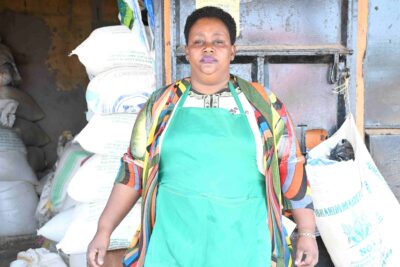Anifah: From GBV survivor to Women’s freedom and Empowerment champion in Bunyoro region
BY: BETTY MUJUNGU.
In the vibrant heart of Hoima City, a captivating scene unfolds each morning, centered on the indomitable Ms Kabagaya Paulline Anifah, a determined 38-year-old managing her bustling grocery shop with unwavering dedication.

As the clock strikes 8 am, the exterior of her shop presents a visual feast of goods – basins brimming with rice, beans, and cowpeas, accompanied by neatly arranged bags of posho, all poised patiently for their discerning customers.
With the shop door wide open, Anifah invites passersby into a well-stocked interior that showcases a diverse array of cereals. This daily routine has evolved into more than just a means of livelihood for her; it stands as a testament to her resilience and entrepreneurial spirit.
Her commitment to the business is palpable, echoing the rhythm of the city waking up to a new day.
Looking at Anifah’s passion, one might believe that she was destined to be a businesswoman. Her customers, filled with admiration, affectionately refer to her as a champion – a title typically associated with a gold medalist in a prestigious competition.
However, for Anifah, this Title is not a result of sporting triumphs; instead, it reflects the lives she has transformed, particularly among those who have endured the harsh realities of gender-based violence.
Beyond the grocery shop lies a deeper narrative, one that intertwines entrepreneurship with a profound social impact.
Ms Anifah emerges not only as a successful businesswoman but also as a beacon of hope and empowerment for those who have found solace and support within the folds of her compassionate endeavors.
Anifah stands as a champion foot soldier, dedicating herself to the cause of justice since 2018. Her advocacy extends to individuals, particularly those whose rights in the realm of sexual and gender-based violence have been brutally violated.
Before embarking on her journey as a businesswoman alongside her sister, Anifah shared the harrowing details of navigating the complexities of family life, raising four children.
However, in 2014, she made the courageous decision to separate from her husband after enduring immense suffering, including a life-threatening incident where her husband attempted to set her ablaze with a jerrican of fuel.
This drastic choice of separation was prompted by the horrifying reality of beatings and assaults that had become unbearable. Anifah, residing in Isaaka Lower Cell in Central Division, Hoima City, prioritized her safety and well-being, recognizing that escaping the toxic relationship was paramount.
Her community bestowed upon her the moniker “champion,” a title earned through her resilience and determination in the face of adversity.
“My husband became addicted to alcohol and started using other drugs, engaging in infidelity. When he returned home, he would attempt to force me into unwanted sexual encounters. If I resisted, he would resort to physical violence. One night, he even threatened to burn me and our children alive, arriving home with a jerrican of petrol,” Anifah revealed. “Thankfully, I was rescued.”
Married at the tender age of 16, Anifah said she endured immense suffering until she mustered the courage to confide in her parents and report the abuse to the police in Hoima.
She recounted the brutalities inflicted upon her by her husband, highlighting the escalating violence.
“When I reported him to the police, instead of complying with the summons, he not only refused but also turned the threat on me, vowing to kill me. Every night, he sought to exert control, sometimes resorting to forced sexual acts,” Anifah shared.
Anifah’s life took a positive turn in 2018 when she attended a meeting organized by Reproductive Health Uganda (RHU) in Hoima district, now a city.
“During the meeting, the discussion delved into critical issues such as gender-based violence (GBV), family planning, and HIV/AIDS, among others. Having personally experienced GBV at home, I deeply empathized with the cause and decided to join the initiative to gain knowledge. Leveraging my own challenging experiences with GBV, I actively participated in training sessions, providing real-life examples to educate others.”
She expressed that the empowerment she received during these training sessions transformed her into a champion and ambassador for the cause, inspiring her to actively contribute to addressing issues related to GBV, family planning, and HIV/AIDS.
One of the crucial aspects she is actively involved in is following up on cases of rape and defilement, ensuring that they are reported to the relevant authorities and concluded, while minor cases are addressed at a community level.
“I stress the crucial importance of taking swift action, as some individuals may attempt to collude with perpetrators. Through my empowerment efforts, I have consistently championed justice, providing assistance to numerous families grappling with issues of gender-based violence (GBV). However, my journey has been riddled with challenges.
Initially, when I approached the police, I encountered resistance, with certain officers dismissing my concerns. Undeterred in my commitment to making a difference, I engaged with both Reproductive Health Uganda (RHU) and police commanders, gradually building recognition that has significantly improved the handling of reported cases. Today, when I report a case to the police, I observe a marked positive shift, with files being attended to promptly in the pursuit of justice.
To further support women, I have played a key role in forming groups, some dedicated to savings and others focused on providing financial assistance to fellow women. One notable association is named ‘Go Back to School,’ with the aim of ensuring that children do not miss out on education.
“I have empowered women to save money, and through our ‘Go Back to School’ association, members contribute between Shs 3,000 to Shs 10,000. At the beginning of each term, we distribute funds to cover school fees and other educational requirements,” I explained.
However, amidst these efforts, I acknowledge that few individuals at my level are willing to advocate for the rights of others in the realm of gender-based violence (GBV) and sexual and gender-based violence (SGBV).”
During these outreach efforts, including door-to-door sessions and village gatherings, she noted an interesting dynamic. Some individuals, after participating, requested compensation. This peculiar request stems from the lingering mindset in certain quarters that attendance at such meetings should be monetarily compensated.


